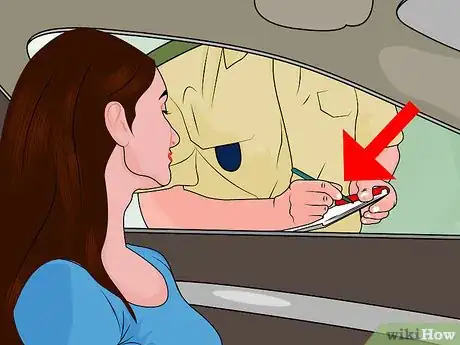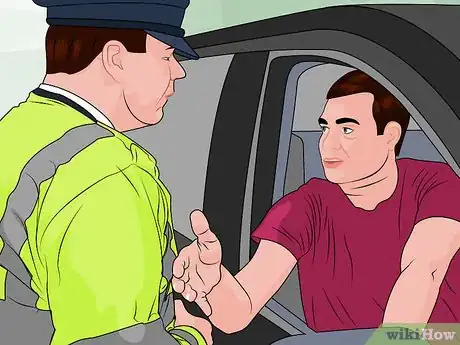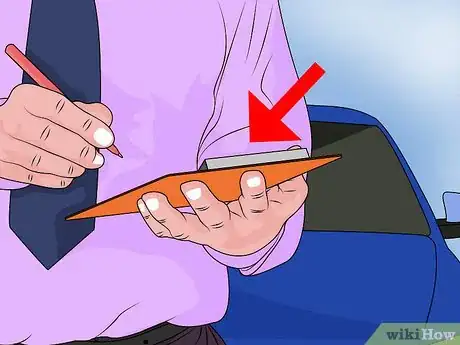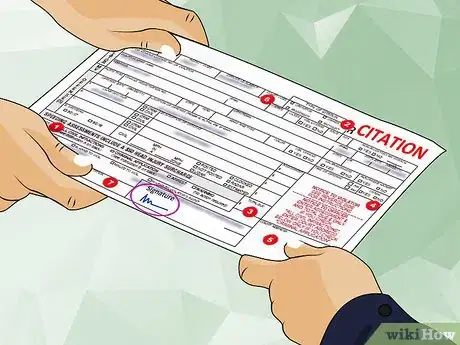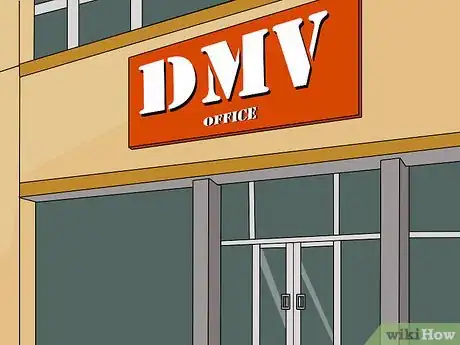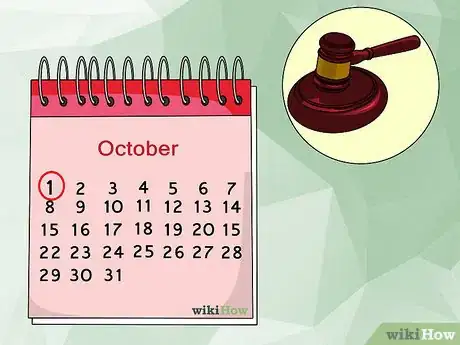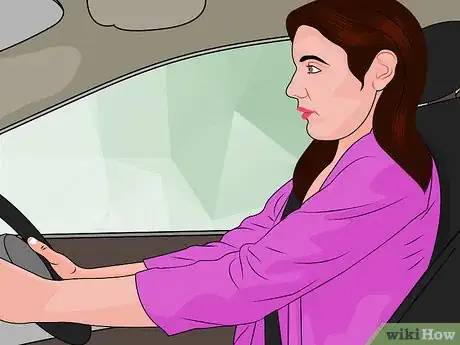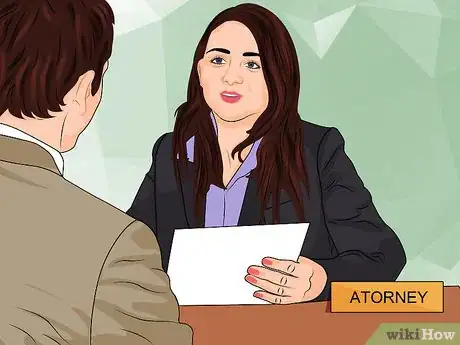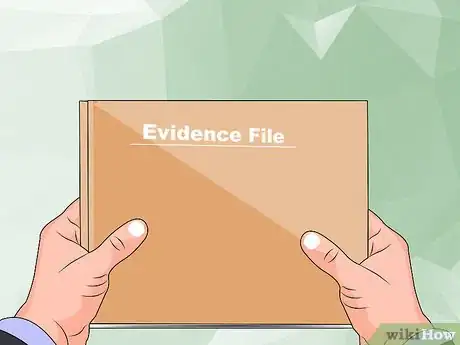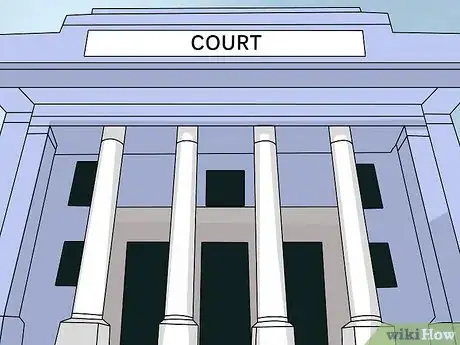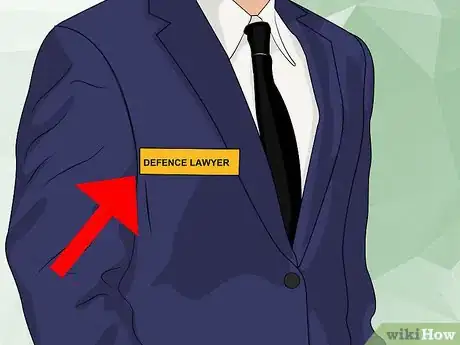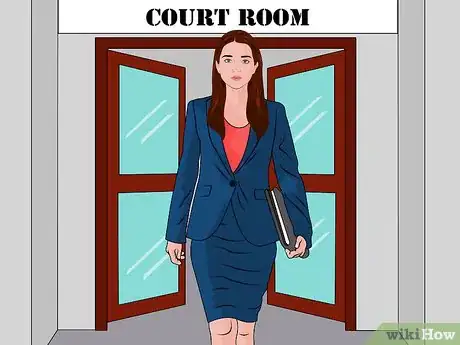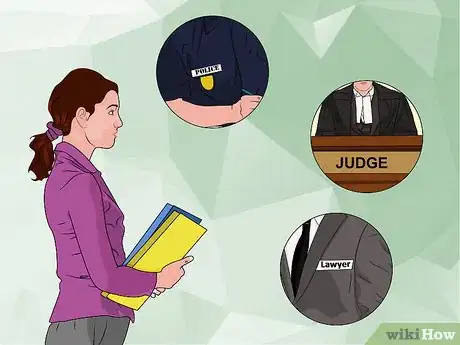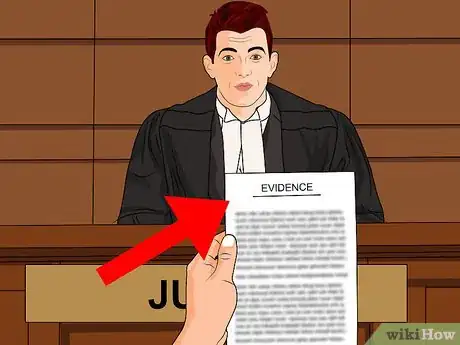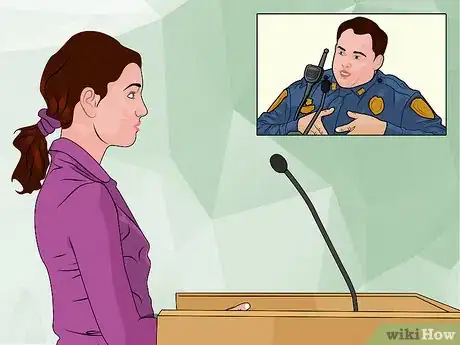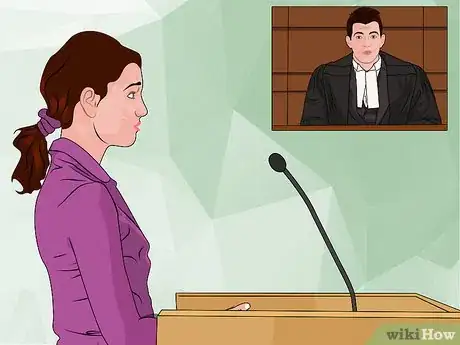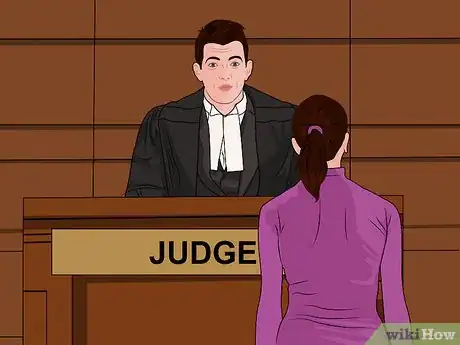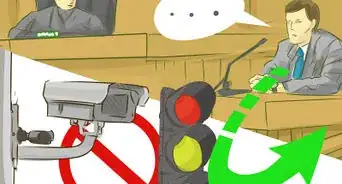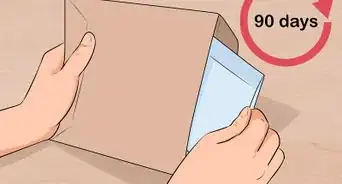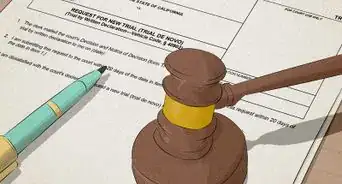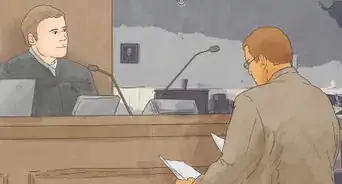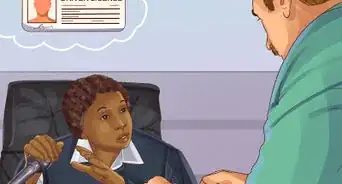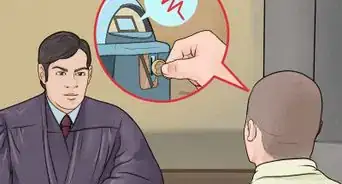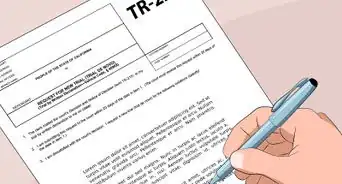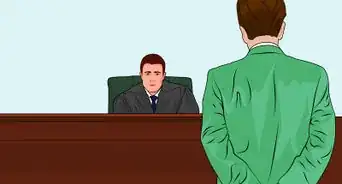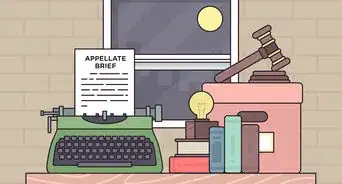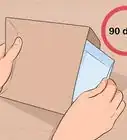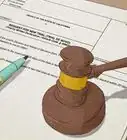This article was co-authored by Clinton M. Sandvick, JD, PhD. Clinton M. Sandvick worked as a civil litigator in California for over 7 years. He received his JD from the University of Wisconsin-Madison in 1998 and his PhD in American History from the University of Oregon in 2013.
This article has been viewed 107,533 times.
A speeding ticket can result in huge fines and an increase in your insurance premiums. Thankfully, there are successful ways to fight a speeding ticket. In fact, roughly half of the drivers who do take a speeding ticket to traffic court end up winning the fight.
Steps
Planning Ahead
-
1Follow standard procedures when you're first pulled over. You want to make sure you behave in accordance to the law when you're pulled over for speeding. This way, your character will look good during trial and you're more likely to successfully avoid a speeding ticket.
- Pull over as soon as you see the officer's lights and there is a safe spot to do so. You do not want to pull over in an intersection or anywhere else you might obstruct traffic. However, try not to wait more than 30 seconds to find a safe spot. Immediately put on your hazard lights to show you are respectful of the safety of other drivers on the road.[1]
- Keep you hands visible as the officer approaches your car, placing both hands on the steering wheel. You do not want the officer to think you are being hostile or reaching for a weapon. When the officer asks for your license and registration, politely explain where these documents are and ask permission to reach for them.[2]
- Show respect in your actions and words. No matter what happens, you must be polite and submissive. Do what the officer asks of you without arguing or getting defensive.[3]
-
2Answer the officer's questions appropriately. If you're being pulled over for speeding, the first thing the officer will ask you is if you know how fast you were going. Be prepared to answer this question in a way that does not further your legal trouble.
- When the officer asks you, "Do you know why I stopped you?", answer, "No, I don't." Answering that you were speeding can be taken as an admission of guilt and sabotage your chances of successfully fighting the ticket.
- If he asks how fast you were going, you do not have to answer the question. You have the right to remain silent. However, if you want to give some answer do not admit guilt here. Do not say, "I was going 62 in a 55 zone," for example. Instead, give a noncommittal answer like, "I'm not really sure."
- Now is not the time to fight your case. Do not say something like, "I wasn't speeding. I checked my speedometer." If you anger or otherwise frustrate the officer, he will probably remember you and be more likely to have specific memories and notations that can help the prosecution during trial.
- If the officer asks to search the vehicle, you have the right to refuse. A search warrant is required without probable cause. If the officer says he will get a search warrant, politely tell him to do so and continue to refuse a search.
Advertisement -
3Gather information at the scene. While the officer is writing your citation, take advantage of this time to survey the scene.
- Write down the make, model, license plate and unit number of the officer's car.
- Take note of your precise location and try to get an approximate sense of where the alleged violation took place.
- Take note of any weather conditions, such as rainfall or clouds, that could obscure the officer's judgment. Also, pay attention to the traffic conditions and look especially for extenuating circumstances that could have caused inadvertent speeding.
- If you have any passenger's, take note of their names and make sure they stay silent during the exchange.
- Write down anything the officer says.
- Note as many small details as possible. This will help you look like a credible witness in court. Pay attention to your shirt color, any small dents or cracks in your car, and any noticeable physical characteristics of the officer.
-
4Sign the citation. Once the officer returns to the car, he will hand you a citation to sign.
- Remember, this is not an admission of guilt. It is merely an acknowledgment that you received the citation and understand you're receiving a speeding ticket.
- Politely ask the officer if he can move the court appearance to the county seat. If he refuses, ask him to note the request. Having the appearance moved closer will make fighting the ticket easier for you.
- Do not refuse to sign the citation. Once again, it's not an admission of guilt and refusing to sign it will not make you look favorable in the officer's eyes.
-
5Leave the scene calmly. Wait for the officer to pull out before you leave the scene and do so in a calm, collected manner. You do not want to appear angry or otherwise confrontational while leaving the scene as anything that makes you more memorable to the officer can result poorly for you during trial.
Preparing for Trial
-
1Learn your options for fighting the ticket. When it comes to contesting a speeding ticket, you have a variety of options in terms of the route you take.
- When you contest a ticket, you must enter a plea. Pleading guilty means you're accepting the ticket and paying the resulting fines, which will raise your insurance premiums. Pleading "No Contest" means you're not contending the charges but not pleading guilty either. This will, however, result in the same consequences as pleading guilty. Pleading "Guilty with explanation" means you admit to speeding but want to the court to take certain circumstances into consideration, which may result in your insurance premiums staying the same. However, the best way to avoid losing money over a speeding ticket is to simply plead "not guilty" and fight the ticket in court.
- You should only plead "guilty with explanation" if you were speeding due to an emergency.[4]
- If you plead "not guilty," focus your defense on either challenging the officer's means of measuring your speed or his identification of your automobile. If there were many other cars similar to yours on the road that day, the officer may have pulled you over by mistake.[5]
- Always check with your insurance before fighting a ticket. You want to see how much a conviction would affect your insurance premiums and whether the raise would be more or less than it would be if you simply accepted responsibility and paid the fine. Remember, only 50% of people who fight traffic tickets get their tickets dismissed.
-
2Set your court date. Once you've entered a plea, it's time to set your court date so you know how long you have to prepare your case.
- There are three ways to set your court date. You can appear before a judge and enter a Not Guilty plea as well as a request for a court date. You could go to the County Clerk's office and request a trial date. You could mail a copy of the citation to the courthouse, along with a request for a trial date.
- You usually have to post bail in the amount of the fine, so check with the court to make sure you have the proper amount and proper payment method. Posting bail means you've already paid your fine, so if you lose your case there will be no additional fees.
- Your trial will occur within 45 days of the day you enter you plea. As soon as you've entered your plea, begin preparing for trial.
- Before hiring a lawyer, ask if it will cost you more money to hire a lawyer than if you were to just pay the ticket.
- If this is your first time ever receiving a speeding ticket, some states like New York are willing to dismiss your ticket if you complete a defensive driving course, usually offered in driving schools. However, this can only be used once. Call your DMV or licensing agency to see if your state has a similar program.
-
3Visit the Department of Motor Vehicles. The first step to prepping for your defense is to make a trip to the Department of Motor Vehicles. You can get certain records at the DMV that can help you with your case.
- You can verify the status of your driving record at the DMV. If you do not have previous traffic violations and have a clean driving record, bringing this kind of evidence to court can help your case. Someone at the DMV should be able to help you print your driving record for a small fee.
-
4Review your rights. You should know your rights as a defendant while going into court. Rights are often glossed over in traffic court to try and speed through the process and get you to pay the ticket. Review your rights before the trial begins.
- You have the right to a court trial with a judge. A jury will usually not be called in for traffic court.
- You do have a right to an attorney but, as previously discussed, this is probably not necessary when fighting a speeding ticket.
- You have the right to subpoena witnesses or documents. This is an important right to be aware of. If there's anyone who can verify you were not speeding, call them in to testify. Do not call the officer who pulled you over to testify, however, as he will want to see you pay the fine to keep his reputation intact.
- You have the right to cross-examine anyone who testifies against you, which usually means the officer who wrote the citation.
- You have the right to remain silent. In other words, you do not have to testify against yourself. You should probably avoid testifying against yourself while fighting a speeding ticket as it is unnecessary and could make you look bad.
-
5Gather evidence. While you wait for your trial, you should begin gathering evidence to support your case.
- Go back to the scene of the citation. You should sketch a diagram of the scene that includes all roads, making the width of lanes, traffic controls like lights and signs, the location of your vehicle and the officer's vehicle when you were pulled over, any buildings, power lines, foliage, fences, or other notable features of the area.
- Submit a request for certain public records. You should review the actual vehicle code in the area where you were allegedly speeding to make sure the officer pulled you over for the correct violation.
- You can submit a discovery subpoena to the court to get certain documents that may help your case. You should get documents on the radar device used to determine your speed to check for any malfunctions or recent repairs. You should get a record on the police officer to look for any previous cases he's won or lost in traffic court. You should also get some information on the patrol car regarding any recent repairs or damages to the car.
-
6Visit the court. If you have time, visit the court and watch the judge oversee a few cases. You want to see how the judge interacts with defendants to get a feel for his personality. You also want to see what his relationship is with the prosecutor and the testifying officer. This should give you a sense of how intense your trial will be.
-
7Choose your defense. Reviewing all the information you've gathered, pick a line of defense you feel will be most likely to help you win your case.
- A lack of prosecution witness is an easy way to get a ticket dismissed. If the officer does not show, which happens sometimes, you will be found not guilty. Be prepared to use this as your defense if the officer is not present on your court date.
- If the prosecution fails to prove the case against you, you will be found not guilty. Knowing the code well, and having good witnesses and diagrams of the crime scene, can help you win your case this way.
- Technicalities can also help you get your ticket dismissed. If the officer was in the wrong jurisdiction or enforcing the wrong code for the area, for example, the judge would likely rule in your favor.
- You can also get the ticket dismissed by proving a factual error. For example, you could prove you were driving the proper speed or the radar reading was inaccurate.
Attending the Trial
-
1Choose appropriate attire. When you enter the courtroom, you need to make a good impression on the judge. Choose an appropriate and professional looking outfit. Dress as if you were interviewing for a job. This will make you appear reliable and responsible.
-
2Familiarize yourself with the different members of court. Make sure you know the members of the courtroom on your trial day.
- The defendant is you, as you're the person fighting charges.
- The prosecutor/ADA is the individual or team working on behalf of the state to prove your guilt.
- The judge is the person overseeing the case, who has final authority on the rulings. He will have a court clerk, who is his assistant. A bailiff will help conduct the ceremony of a trial.
- The police officer, if he shows up, will be the main witness of the prosecution.
-
3Present your defense. The trial will begin with you stating your case. This is where you present the evidence you've gathered to show the judge why you believe your ticket should be dismissed. This can be a stressful procedure, so be sure to practice your opening statement several times before the trial date.
-
4Listen during the prosecution's case. Once you've presented your defense, the prosecution will make their case against you.
- The prosecution will strive to prove you're guilty beyond a reasonable doubt. To do so, the prosecutor will usually call up the officer who issued your citation and ask him a series of questions in an attempt to establish his reliability.
- Take notes during the prosecution so you can prepare your cross-examination. On one side of a sheet of paper, note what was said. On the other side, note your possible comments and questions to raise during cross-examination.
-
5Cross-examine the prosecution. During the cross-examination, you have a chance to ask the witnesses brought by the prosecution a variety of questions. The goal is to undermine their authority and bring about reasonable doubts that you committed the violation.
- Ask specifics. Making it appear that the witness does not remember facts correctly casts doubt in the judge's eyes. The details you wrote down earlier in terms of the incident you were pulled over will come in handy here. If the officer, for example, does not remember it was raining and a Tuesday he might not look like a less reliable witness.
- Ask questions you think might help your case. If, for example, you're trying to prove the officer pulled over the wrong car ask if he remembers that there were two other blue Honda Civics on the highway that morning. If you're trying to prove his radar system was faulty, ask if he was aware at the time of the citation his radar device was 3 weeks overdue for basic maintenance.
- Remember, you're not making any arguments during cross-examination. You're only asking questions.
-
6Understand the judge's ruling. Once the judge has heard both sides, he will make a ruling. He will either decide to dismiss the ticket or ask you to pay the fine.
- If the judge rules against you, you can appeal the case to a higher court. However, an appeal is not a new trial with new witnesses. An appellate court will only look to see if any legal errors were made and whether these errors affected the final decision in the case.[6]
References
- ↑ http://www.hg.org/article.asp?id=6090
- ↑ http://www.hg.org/article.asp?id=6090
- ↑ http://www.hg.org/article.asp?id=6090
- ↑ http://traffic.findlaw.com/traffic-tickets/fight-a-speeding-ticket-is-speeding-always-speeding.html
- ↑ http://traffic.findlaw.com/traffic-tickets/fight-a-speeding-ticket-is-speeding-always-speeding.html
- ↑ http://www.courts.ca.gov/10013.htm
About This Article
Before you try to fight a speeding ticket, check with your insurance to see how much your premiums will increase if you fight the ticket and lose since they might go up more than if you were to just plead guilty. If you were speeding due to an emergency, consider pleading "Guilty with explanation," which may prevent your insurance premiums from going up. Otherwise, to fight your ticket you'll need to plead "Not guilty" and challenge the officer's measurement of your speed or their identification of your vehicle. For more tips from our Legal co-author, like how to prepare for your speeding ticket trial, read on!
